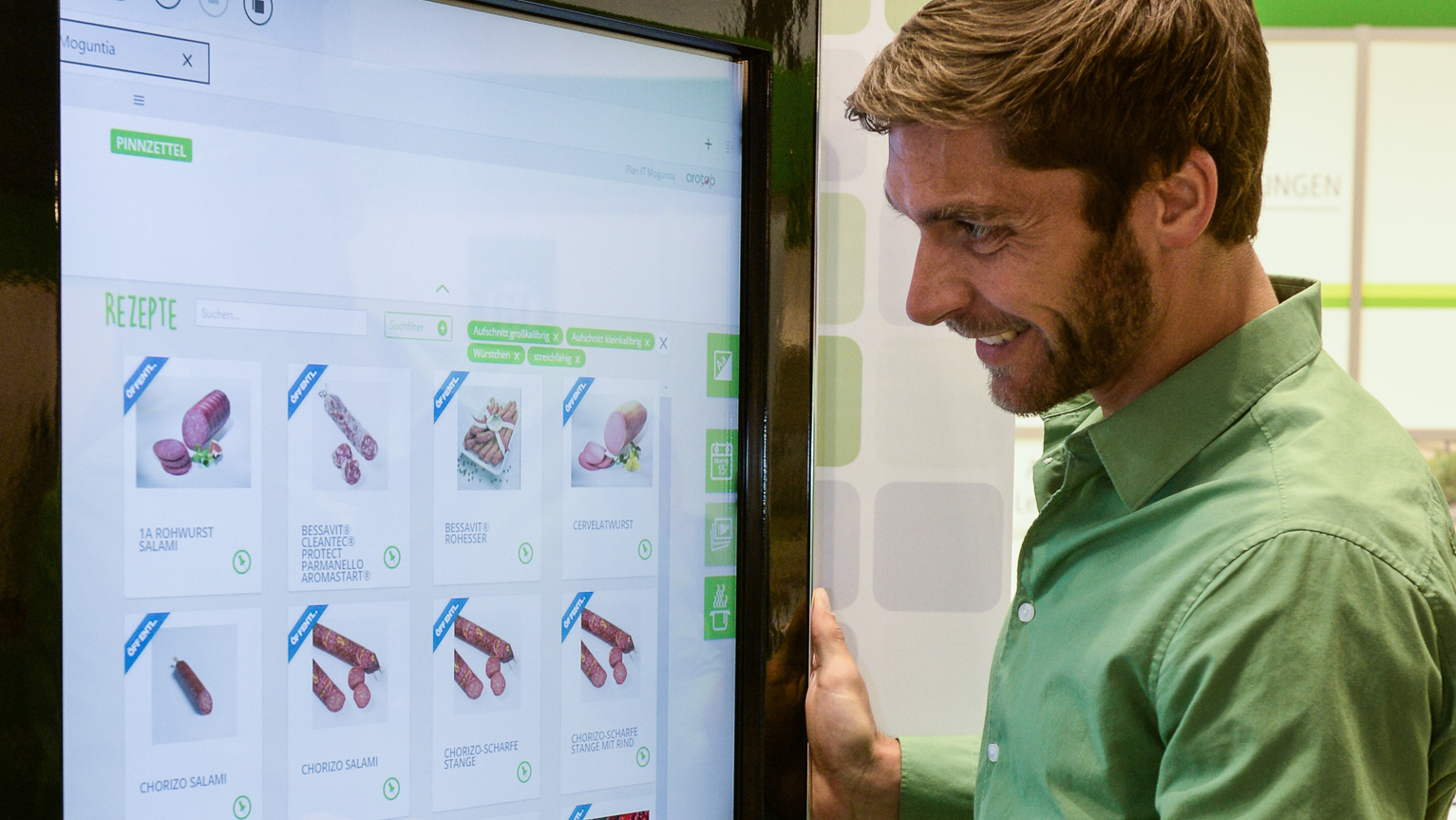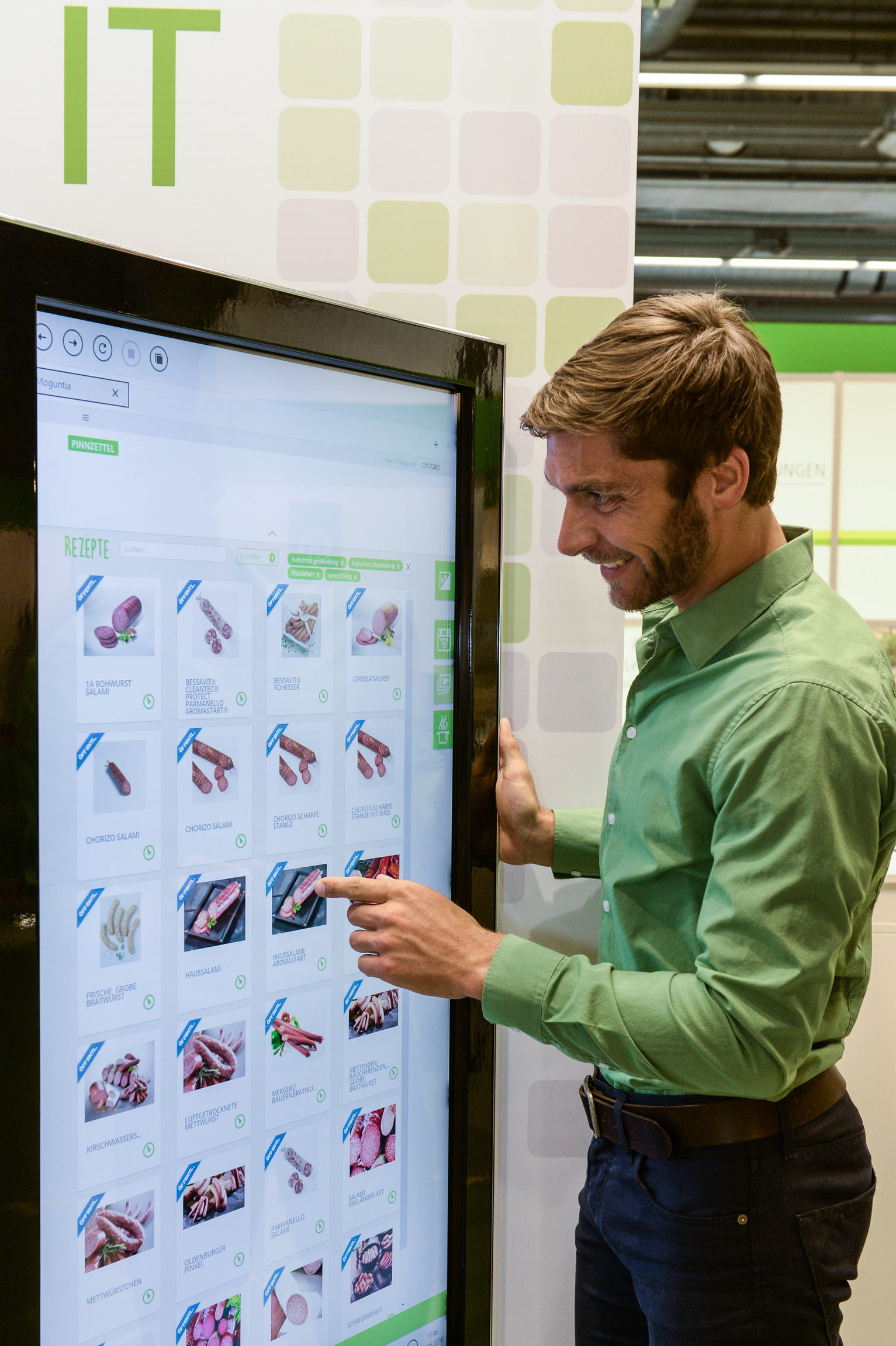Against the background of the continuing good economic situation that pertains in the butchery and meat-processing trade, the lack of qualified, specialist staff is leading to excessive workloads in many businesses. Any unused potential for efficiency savings must be seized upon. One such measure is investment in modern, often digitally supported, technologies. That way, time-consuming routine work can be done more quickly with digital support – the major aim being: more time for the customer. The range of modules and solutions on offer is huge.

Customer communication with potential
Digitalisation also means adding a whole new dimension to customer relations. For Max Beck, Master Butcher in the Opfer butcher’s business in Ringgau and already well-established as the blogger called ‘Wursthandwerker’ (‘Artisan Sausage Maker’), digitalisation means, first and foremost, using social media to communicate with customers. He says: “We are a small business with a retail shop and, for me, the focus, when it comes to digitalisation, is on the use of digital media. So, I can, for instance, advertise on Facebook a promotion that is set to take place next week and it will reach exactly the people who need to know about it – without any scatter loss.” Moreover, he is planning to update the existing online shop. “Nevertheless,” says Max Beck, “the principle is that first purchases should be made in the shop or at one of our market stalls and with advice from us, with subsequent purchases online.”
Automating business procedures
Bechtel, a butchery firm in Zella, have opted for solutions relating to business procedures. This meat company, which has three subsidiaries and a wholesale business, operates with a fully automated time-log system for its staff. Johannes Bechtel, a Master Butcher with a Bachelor’s degree in economics, finance and accounting, is driving the digital revolution in his parents’ butchery firm. He says: “Time-logging made things hugely easier for us. Another sensible digital application is the use of telemetry in our sausage dispensers, that stand outside two of our subsidiaries. I check the stock on my mobile.” And plans are afoot for yet more change to cover digital documentation of hygiene measures. And, of course, there is the online shop too. Johannes Bechtel continues: “Only fully automated ordering procedures can make things really easy and convenient for our online customers.” And this is also what he expects – as a user – of digital applications: “They need to be designed to be quick and easy to use, whilst, nevertheless, allowing the staff to do the work “by hand” as artisans. And – we mustn’t forget – they need to be secure, too!”
Tailor-made solutions
Max Esser, Master Butcher at sausage specialists ‘Wurstspezialitäten Esser’ from Erkelenz, tells us: “Digitalisation is, for us, a means to an end. We are not successful simply because we have gone digital, but because we offer quality products and expert advice. However, we might well not have achieved this without digital help. We use digital applications above all, to make the job easier for our staff – like the shop scales. With so many different item numbers, we can’t expect staff to be able to get their heads round them very quickly; and this is particularly true of trainees and people who come into the profession from other areas. We currently have a mix of digital and still too many analogue systems in operation and this mix is too much to make life easier for our staff. We must become more digitally efficient. As long as we need to enter the item number somewhere on the scales by hand, the digital scales are not efficient enough.” In the production departments, Esser, together with their more than 25 subsidiaries, use a merchandise management system. This enables them, for example, to quickly create delivery notes and systematically plan the price of the goods we offer, explains Max Esser. “There is no one perfect solution – most are actually too complicated. Everyone must take a look for themselves and see what suits their business best. If a digital solution doesn’t make the job easier, then it doesn’t suit the business.”
The Association of German Butchers (Deutscher Fleischerverband) has created a strategy committee to deal specifically with the ‘Digital Revolution’ and has thus made the issue an important aspect of association policy. The members of this think tank meet regularly and will, amongst other things, be devising recommendations for action for their professional colleagues. Gero Jentzsch, Head of Communications in the Association of German Butchers says: “First and foremost, we deal with issues that serve to optimise business procedures. A butcher’s shop will always remain an artisan business, producing high-end artisan food – that is its strength - but the way in which the concomitant procedures work - I mean things like, for example, the ordering process or other office procedures – can be improved through the use of digital services.
IFFA: the leading trade fair for all things relating to meat
IFFA is the number 1 port of call for the butchering and meat processing professions. From 4 to 9 May, over 1,000 suppliers will be showcasing their new products, together with trends across the whole meat-processing chain. An important product group for the artisanal trade can be seen in the new Hall 12.0. Here leading suppliers will be exhibiting under the heading ‘Sales – everything for butchers’ shops’ and will be focussing on this key area. And the competition area of the German Butchers’ Association has also been relocated to this hall. In Hall 12.1, visitors will be able to see the trends and new products relating to ingredients, spices and seasoning, excipients, sausage skins and packaging materials. The market-leading companies represented here are major partners in artisan meat processing. In Hall 11 are the product groups for packaging, utilities, measuring and weighing technologies, together with suppliers in the field of processing/cutting. Manufacturers from the slaughtering and cutting segments are again represented in Halls 9.0 and 9.1. Products relating to meat processing are to be found in Hall 8.
All information about IFFA, as well as tickets, can be found at:
www.iffa.com
Press releases & images:
On the internet:
Background information on Messe Frankfurt
Messe Frankfurt is the world’s largest trade fair, congress and event organiser with its own exhibition grounds. With over 2,500* employees at 30 locations, the company generates annual sales of around €715* million. Thanks to its far-reaching ties with the relevant sectors and to its international sales network, the Group looks after the business interests of its customers effectively. A comprehensive range of services – both onsite and online – ensures that customers worldwide enjoy consistently high quality and flexibility when planning, organising and running their events. The wide range of services includes renting exhibition grounds, trade fair construction and marketing, personnel and food services.
With its headquarters in Frankfurt am Main, the company is owned by the City of Frankfurt (60 percent) and the State of Hesse (40 percent).
Further information is available at: www.messefrankfurt.com
* provisional figures 2018
Download
- IFFA 2019 - Digitalisation for the trade (pdf, 84 KB)
